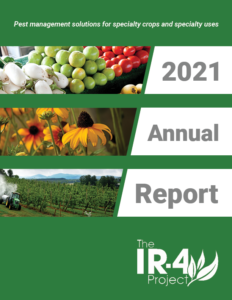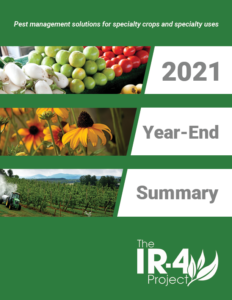Twenty twenty-one was a year the IR-4 Project will not soon forget. Despite the challenges we continued to face in the second year of the coronavirus pandemic, our team has maintained an uninterrupted level of service and support for our growers and stakeholders, while also accomplishing significant achievements.
In October, we completed the move of IR-4 Headquarters to NC State University. I’m thankful to the leadership of the university and the College of Agriculture and Life Sciences for believing in our work and welcoming us to the Wolfpack, as well as to the members of our Project Management Committee for their continued guidance and support during this historic move. Finally, and most importantly, I want to thank our Headquarters teams at both Rutgers and NC State for working together to make this possible. Moving nearly 60 year’s worth of files, servers, and systems is no small task. I’m honored to see our staff remain dedicated to our work during this complex period for our organization.
Our accomplishments last year were not limited to our headquarters move. In 2021, we held multiple virtual events that brought together hundreds of partners and stakeholders. These included our annual Industry Technology Session, Food Use Workshop, and biennial Environmental Horticulture Program Priority Setting Workshop, as well as the launch of our new virtual crop tour series. A huge thanks to our team for coordinating these events, and our partners for your continued support in this virtual world!
In August, IR-4 received a $56 million, four-year operating grant from the U.S. Department of Agriculture National Institute of Food and Agriculture (USDA-NIFA). While not an increase in funding, this grant is historic for several reasons. For the first time, our Headquarters host university was able to apply for the funding through a single, four-year grant application. Previously, our five host universities had to submit separate applications each year to USDA for their share of the annual operating grant. Now, NC State University will provide each university with their share of the overall operating grant, making operations more efficient.
Additionally, all five host universities agreed to waive indirect costs for the first year of this grant, giving us the ability to funnel these dollars toward needed research and continue our work with minimal disruption. I want to thank the leadership at NC State University, Michigan State University, the University of California, Davis, the University of Florida, and the University of Maryland Eastern Shore for their continued support of IR-4’s work.
Speaking of grants, the IR-4 Commodity Liaison Committee continues to advocate for increased funding for IR-4. They made great strides in 2021 in achieving the first funding increase in over a decade. At the time of this writing, both the House of Representatives and Senate have proposed an increase ranging between 17.5 and 22 percent. If they come to an agreement on funding, new resources will be available. Many thanks for the time and effort by this group for their support. A special shoutout and sincere thanks to Dr. Michael Bledsoe who steps down after six years as chair of the CLC, and welcome to Todd Scholz as he takes over this important role.
All of the work and milestones mentioned above were done while our researchers, study directors, and other team members worked on numerous studies and research projects in an effort to meet the pest management needs of specialty crop growers. More information about our research and regulatory work can be found in our 2022 Year-End Summary and our 2021 Annual Report.
As our team continues to meet the needs of our stakeholders in the 21st century, I want to thank everyone who has been involved with the IR-4 Project for your unique contributions to where we stand today as an organization. Our future is bright thanks to your support.
All the best,
Jerry Baron
Executive Director
The IR-4 Project



